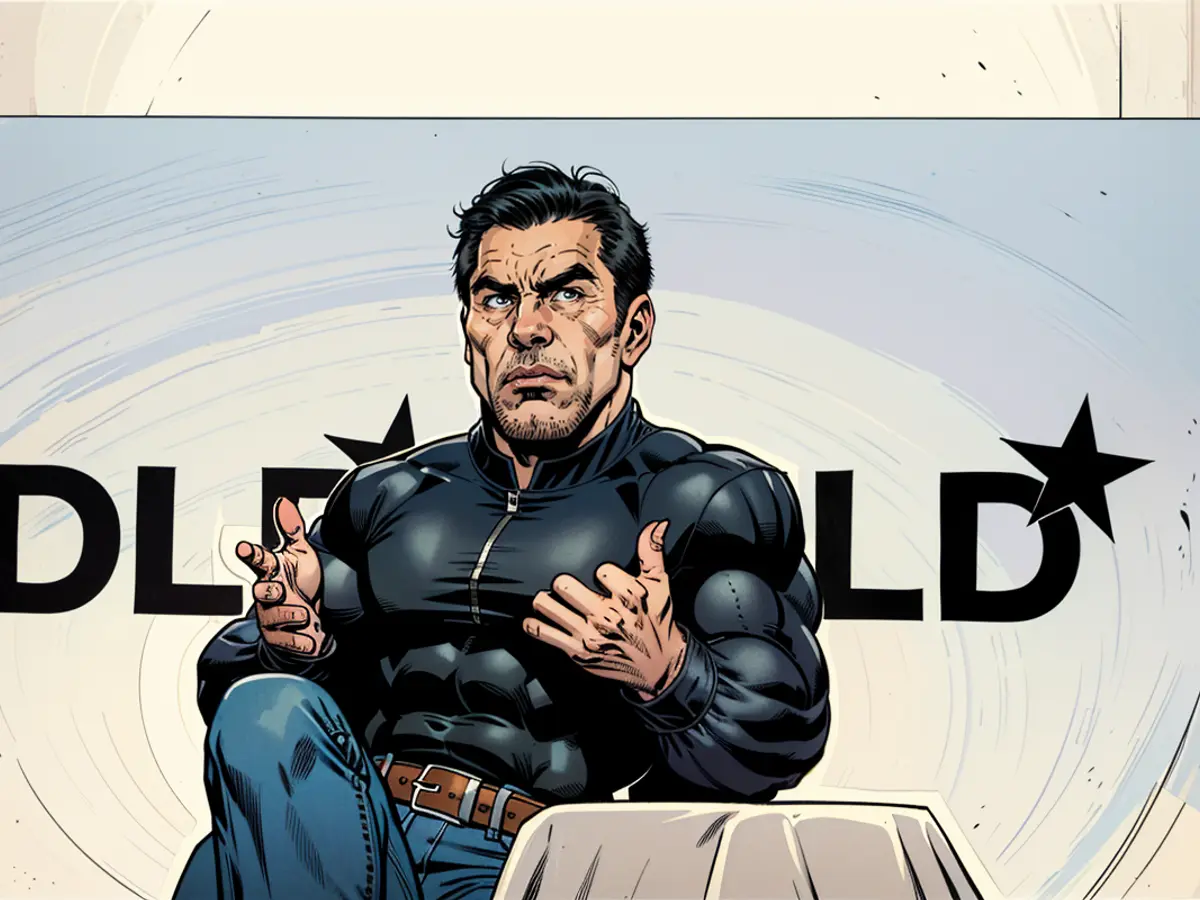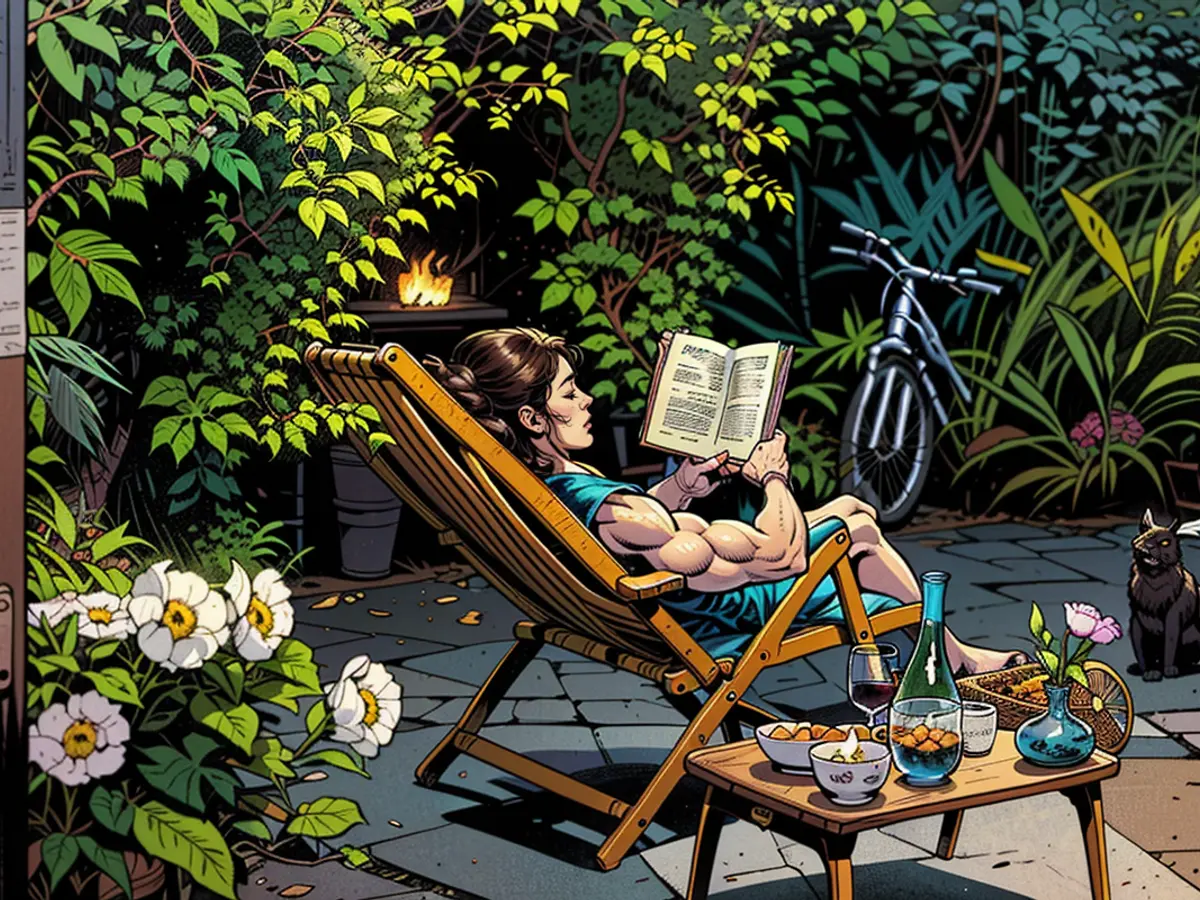Perspective: Five crucial elements to attaining a creative and tranquil existence
This year was an exhilarating yet hectic one for me, filled with travel and countless work events. I unveiled a new book, discussing topics close to my heart such as poetry, sustainability, diversity, gardening, and art. Despite my enthusiasm for these subjects, I ended May feeling overworked and drained, with a persistent headache.
Driven by this fatigue, I began contemplating ways to lead a more tranquil and rejuvenated life. If, like me, you're seeking means to rest more effectively, I've got good news! As summer approaches, I plan to shift my focus solely on rest and relaxation, along with interviewing top American experts in the art of disconnecting. I invite you to follow along.
Kickstarting this exploration is Alex Soojung-Kim Pang, the Director of Research and Innovation at the 4 Day Week, a nonprofit promoting shorter work weeks without compromising pay or productivity. He's the author of multiple publications, including "Work Less Do More: Designing the Four Day Week; Shorter: Work Better Smarter and Less." However, to begin with, I highly recommend his book "Rest: Why You Get More Done When You Work Less." During our June Zoom conversation, I sought Alex's tips for improving our quality of rest.
What initially motivated you to write about rest?
I reside in Silicon Valley – the global capital of overwork and burnout. For a prolonged period, I regarded these issues as the inevitable challenges of striving for excellence.
However, during a sabbatical in Cambridge, I experienced an eye-opening realization that my existing methods of work were not only unsustainable but also detrimental. I became convinced that by understanding and prioritizing rest, reevaluating our daily routines, acknowledging our creative subconscious' role in generating innovative ideas, and making room for seemingly unproductive yet generative activities, we could still lead fulfilling careers and enjoy longer, richer creative lives while maintaining productivity.
You frequently discuss the importance of rest, but you also delve into the factors enabling successful creativity. You also investigate the differences between good and outstanding work.
During my college years, a pivotal course delved into invention, discovery, and the psychology of creativity in the arts and sciences. Examining the lives of creative figures primarily focuses on their work hours – lab or office time, notes, drafts.
However, this narrow focus on creative output overlooks periods of seemingly unproductive leisure or rest, during which the mind is still actively working on unsolved problems. This crucial stage in the creative process has largely remained a mystery, as we lacked a framework to comprehend it. Consequently, we've tended to disregard it.
Recent advancements in neuroscience research on creativity have shed light on this mystery. It provides us with insights into the workings of our creative minds and the benefits of rest. Ultimately, my work aims to address the fundamental questions that my professor raised in my freshman year: How do insights happen? What ingredients contribute to a creative life? How can we apply lessons gleaned from creative lives to our own journeys?
Some readers might ponder: Who qualifies as a creative individual, and is this “resting” approach only for certain types of jobs?
I'd make two arguments. First, the terminology of "creative work" and "creatives" can be misleading. Advancements in technology, such as robotics and automation, have rendered many routine tasks redundant. The tasks that remain are, by definition, creative, whether we classify them as such or not. For example, being a preschool teacher, a social worker, or a sales rep all require judgment, empathy, decision-making, and problem-solving.
Therefore, rest is for everyone. It's crucial for artists, composers, and musicians. However, individuals engaged in highly stressful, demanding jobs, including nurses, emergency room doctors, first responders, also require profound rest to thrive.
Those who excel in these challenging roles maintain clear boundaries between their work lives and personal lives. They possess hobbies or secondary passions that serve as a refuge from their jobs, offering mental satisfaction and permission to disconnect, allowing them to rest better and be more creative under pressure.
Describe the perfect day of a persona who values rest.
First, work! Ideally, you'd work diligently for 90 to 120 minutes, as that's the longest duration we can concentrate before we start to lose focus, followed by 30 minutes of rest. Repeat this pattern two or three times, and you can have a productive and rewarding day.
What's your daily routine?
When I'm working on a book, I wake up between 5:00 a.m. and 5:30 a.m. I work until 7:00 a.m., followed by a break to walk the dogs. This provides me with a creative break, as solutions to problems I've been working on often come to me during the walk, which I jot down in a notebook.

Let's chat about your advocacy for the four-day workweek.
Frequently, it's on us to find more relaxation and that can clash with our coworkers and managers. Yet, everyone is exhausted, overworked, and struggling with work-life balance. The four-day week grants relaxation to all, creating an incentive for teamwork to make it feasible. Mass action is the strongest form of self-care.
The charm of the four-day week lies in its company-wide implementation, where the hunt for relaxation transforms from a no-win scenario into a win-win. Everyone needs to collaborate if they're all to complete the work week on Thursday: my success depends on assisting you to focus and be efficient, so we can all savor a three-day vacation.
Do you think you'll encourage everyone to truly take their summer vacation?
Of course! Vacations are not merely rewards for serving capitalism. Research indicates that they are a vital source of renewable energy, a chance to rejuvenate over the long haul. They improve our lives, they make us healthier.
In an ideal world, you'd take a week off every three months, since happiness levels peak around day eight, and the benefits of vacations last about two months. But the detrimental vacation is the one you neglect.
So shut off your work email. Silence your phone. Leave the house. Let your kids play in the sun. Regard this as authorization.
Here is Alex's advice on how to detach this summer:
1. Take your lunch break. Lunches are usually a legally safeguarded time. You have the right to depart from your desk and spend your lunch with colleagues. Socializing at lunch may sharpen afterwards. And studies show that eating together enhances teamwork, coordination, and collaboration: For instance, firefighters who plan and prepare meals together perform better than those that don’t.
2. Make your meetings shorter and walk if possible: Many of us agree that most meetings are too lengthy or a waste of time. Brief meetings stimulate creativity, produce fewer but more actionable tasks, and create less busy-work. Plus, if you can hold them while walking, that gets your mind moving too, so you can return to your desk with a little extra creative energy.
3. Take ALL your vacation: You may think that not taking vacations shows that you are more motivated or devoted to employers or clients. The truth is people who take their vacations are more productive, more likely to be promoted and have longer careers.
4. Have a hobby that engages you. It's not sufficient just to tell yourself, I'm going to disconnect my phone and put work out of my mind. Have something else to engage you. People who are driven need stimulation, and they find it through challenging, physical, dangerous hobbies — everything from weightlifting to gardening to rock climbing to playing an instrument. For extremely busy, ambitious individuals, serious hobbies provide both a mental escape and a permission structure for rest.
Subscribe to Our Free Weekly Newsletter
- Subscribe to CNN Opinion’s newsletter
- Connect with us on Twitter and Facebook
5. Give your children downtime. For us parents, remember that vacations are a great chance for children to learn how satisfying it can be to manage themselves a bit more. One of the traps of the 21st century is that it's easy to believe that a successful vacation is planned out hour by hour, especially in finding enriching, educational, and entertaining activities for our children.
But children benefit greatly from learning how to do nothing, how to fill hours themselves. Children who have more time doing apparently nothing are more resilient, psychologically better balanced, and even score higher on creativity tests than those who are constantly overbooked.
So this summer, try sending your children out of the house after breakfast. Let them roam a bit more freely. Science advises you to. Just don't forget the sunscreen.

Read also:
In discussing the importance of rest, Alex Soojung-Kim Pang highlights that everyone, regardless of their profession, requires adequate time for rest to thrive and be creative under pressure. This underlines the significance of providing rest not just for artistic individuals, but also for those in high-stress roles such as nurses and first responders.
The concept of creative subconscious and its role in generating innovative ideas is another central aspect of Pang's work. He mentions that our creativity is not merely stimulated during active work hours, but also during seemingly unproductive periods of rest and leisure.
So, to foster and maintain creativity, it's crucial to value opinions discussing the importance of rest, recognizing that everyone needs time to recharge, and paying attention to the benefits of leisure activities to stimulate our creative minds.







